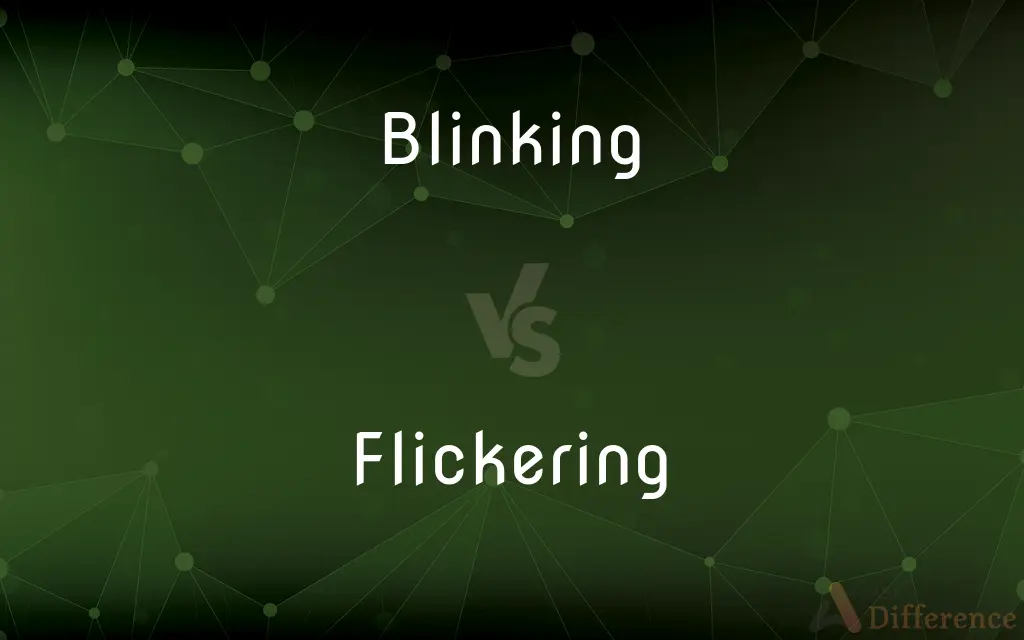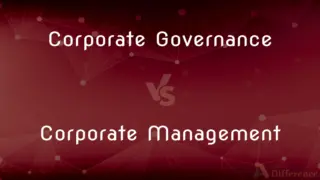Blinking vs. Flickering — What's the Difference?
By Tayyaba Rehman — Published on October 4, 2023
Blinking involves quickly opening and closing the eyes or a light source, while flickering describes a light source rapidly and irregularly going on and off.

Difference Between Blinking and Flickering
Table of Contents
ADVERTISEMENT
Key Differences
Blinking and flickering, while seemingly similar, convey different actions and phenomena, particularly related to eyes and light. Blinking typically refers to the rapid opening and closing of the eyelids, a reflex action that helps to moisten and protect the eyes. It can also pertain to the brief interruption of light, as seen in blinking traffic lights, signifying an on-and-off pattern that usually serves as a warning or indication.
Flickering, on the other hand, generally relates to the fluctuation or wavering of light, often in an inconsistent or irregular manner. A flickering light creates an unstable illumination due to rapid and variable intervals of brightness and dimness. Flickering is usually associated with instability or malfunction, such as a flickering candle flame or a failing light bulb, suggesting a lack of steadiness in the light source.
While blinking is a more structured and regular action, usually related to eye movement or signaling light patterns, flickering is irregular and often unintentional, indicative of instability or disruption in the light. Blinking, whether referring to the eyes or a light source, is typically brief and deliberate, with clear and consistent intervals between the opening and closing or the on-and-off states.
Flickering, conversely, is characterized by its erratic and unpredictable nature, reflecting a lack of uniformity and stability. It often denotes a disturbance or inconsistency in the light source, whether it’s due to external conditions like the wind affecting a flame or internal issues like electrical problems in a light bulb.
In summary, the primary distinction between blinking and flickering lies in their regularity and intent. Blinking is a regular, often intentional action or occurrence, seen in the blinking of eyes or indicating lights, while flickering represents the irregular and usually unintentional fluctuation of light, depicting instability or disruption in illumination.
ADVERTISEMENT
Comparison Chart
Definition
Rapid opening and closing of the eyelids or interruption of light
Fluctuation or wavering of light
Regularity
Structured and regular
Irregular and unpredictable
Associated with
Eyes, indicating lights, warning signals
Candles, failing light bulbs, instability
Intent
Often intentional and deliberate
Usually unintentional and indicative of malfunction
Represents
Protection of eyes, indication, warning
Instability, disturbance, inconsistency in light
Compare with Definitions
Blinking
Blinking is the rapid opening and closing of the eyelids.
Blinking rapidly, she tried to remove the dust from her eyes.
Flickering
Flickering can indicate instability or disruption in light.
The flickering light bulb needed to be replaced.
Blinking
Blinking can refer to the brief interruption of a light source.
The blinking signal light warned drivers to proceed with caution.
Flickering
Flickering is often associated with wavering or unstable illumination.
The flickering flame struggled against the evening breeze.
Blinking
Blinking serves to moisten and protect the eyes.
Blinking helps in lubricating the eyes, keeping them healthy.
Flickering
Flickering can result from disturbances or inconsistencies in the light source.
The shadow on the wall flickered due to the unstable flame of the candle.
Blinking
Blinking can act as a means of non-verbal communication.
She responded to the ridiculous suggestion by blinking in disbelief.
Flickering
To move waveringly; flutter
Shadows flickering on the wall.
Blinking
Blinking can indicate a deliberate on-and-off pattern in lights.
The blinking neon sign attracted the attention of passersby.
Flickering
To burn or shine unsteadily or fitfully
The candle flickered before sputtering out.
Blinking
Blinking is a bodily function; it is a semi-autonomic rapid closing of the eyelid. A single blink is determined by the forceful closing of the eyelid or inactivation of the levator palpebrae superioris and the activation of the palpebral portion of the orbicularis oculi, not the full open and close.
Flickering
To be displayed with fluctuating brightness
A movie flickered on the screen.
Blinking
To close and open one or both of the eyes rapidly.
Flickering
To appear briefly
A smile flickered on her face.
Blinking
To look in astonishment or disbelief, typically with the eyes blinking
Stood blinking at the money they found in the drawer.
Blinked at the results of the experiment.
Flickering
To cause to move waveringly.
Blinking
To look through half-closed eyes, as in a bright glare; squint
Blinked at the page trying to make out the letters.
Flickering
A brief movement; a tremor.
Blinking
To give off light with intermittent gleams; flash on and off
"blazing neon signs, brilliant shop windows, decorations blinking across the fronts of half-finished tower blocks" (Jess Row).
Flickering
An inconstant or wavering light.
Blinking
To pretend to be ignorant of; disregard or condone
A mayor who refused to blink at corruption.
Flickering
A brief or slight sensation
A flicker of doubt.
Blinking
To waver or back down, as in a contest of wills
"This was the first genuine, direct confrontation between this administration and the Soviets. It was the U.S.A. that blinked" (Zbigniew Brzezinski).
Flickering
Shining unsteadily or varying rapidly in brightness (referring to a light or a source of light)
Blinking
To cause to blink
Blinked his eyes to clear his vision.
Flickering
Present participle of flicker
Blinking
To hold back or remove from the eyes by blinking
Blinked back the tears.
Flickering
A short, uncertain burst.
Even after the acrimonious breakup, she still felt flickerings of love for him.
Blinking
To refuse to recognize or face
Blink ugly facts.
Flickering
Shining unsteadily
Blinking
To transmit (a message) with a flashing light.
Flickering
Flickering involves the rapid and irregular fluctuation of light.
The flickering candlelight created a haunting ambiance in the room.
Blinking
The act or an instance of rapidly closing and opening the eyes or an eye.
Flickering
Flickering can denote malfunction or lack of steadiness in a light source.
The flickering streetlight cast eerie shadows on the pavement.
Blinking
An instant
I'll be back in a blink.
Blinking
(Scots) A quick look or glimpse; a glance.
Blinking
A flash of light; a twinkle.
Blinking
See iceblink.
Blinking
That blinks.
A blinking light
Blinking
Bloody
The blinking telly isn't working again.
Blinking
Present participle of blink
Blinking
The act of something that blinks.
The steady blinkings of lights on the console
Blinking
A reflex that closes and opens the eyes rapidly
Blinking
Off-and-on;
The blinking signal light
Blinking
Closing the eyes intermittently and rapidly;
He stood blinking in the bright sunlight
Blinking
(used of persons) informal intensifiers;
What a bally (or blinking) nuisance
A bloody fool
A crashing bore
You flaming idiot
Common Curiosities
Is blinking regular or irregular?
Blinking is typically regular and often intentional, whether related to eye movement or indicating light patterns.
Can blinking refer to a light source?
Yes, blinking can also refer to the brief, regular interruption of a light source, often used for signaling or warning.
Is flickering usually regular?
No, flickering is usually irregular and unpredictable, often indicative of a malfunction or instability in the light source.
Is flickering associated with failing light bulbs?
Yes, flickering is often associated with failing light bulbs, indicating electrical problems or instability in the bulb.
What does flickering represent?
Flickering represents the rapid and irregular fluctuation of light, often indicating instability or disruption.
Does blinking serve a purpose for the eyes?
Absolutely, blinking serves to moisten and protect the eyes, keeping them healthy and removing irritants.
Can flickering occur with candle flames?
Yes, flickering is common with candle flames, especially when affected by external conditions like wind.
What is blinking?
Blinking is the rapid opening and closing of the eyelids, or a light source going on and off rapidly.
Can blinking be used for non-verbal communication?
Yes, blinking can act as a form of non-verbal communication, conveying messages or reactions without words.
Share Your Discovery

Previous Comparison
Corporate Governance vs. Corporate Management
Next Comparison
Sample Mean vs. Population MeanAuthor Spotlight
Written by
Tayyaba RehmanTayyaba Rehman is a distinguished writer, currently serving as a primary contributor to askdifference.com. As a researcher in semantics and etymology, Tayyaba's passion for the complexity of languages and their distinctions has found a perfect home on the platform. Tayyaba delves into the intricacies of language, distinguishing between commonly confused words and phrases, thereby providing clarity for readers worldwide.
















































